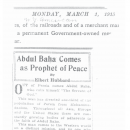Main menu
- ‘Abdu’l-Bahá’s Journey
- World Peace
- Stopping Racism in America
- Empowerment of Women
- More Principles...
- Prayer for America
‘Abdu’l-Bahá Comes as Prophet of Peace By Elbert Hubbard
OUT of Persia comes ‘Abdu’l-Bahá, who calls himself “The Servant of God.”
This man has diverted one-third of the population of Persia from Mohammedanism. Throughout all Asia, Europe and United States there are constantly growing bodies of adherents to the faith of ‘Abdu’l-Bahá.
This man comes to the Western world on a distinct mission, and no one who meets him can doubt his sincerity.
The message he brings is the unification of the world in the bonds of brotherly love, and an understanding which means peace on earth, good-will toward men.
ACCORDING to ‘Abdu’l-Bahá, we will soon live in a period of time that marks the beginning of the mollennium — a thousand years of peace, happiness and prosperity.
After that ‘Abdu’l-Bahá does not say what will happen, but he does not preach disaster.
He thinks that after the thousand years still better things are in store for us. He has the world-vision, and sees clearly this new time upon which are now reaching. He upholds the dawn of the Great Peace upon the horizon of the world. His Business is to proclaim it.
The refrain of his message is always and forever: “The day of the Lord is at hand. God’s kingdom of peace and love shall be established upon the earth, and the dreams of all the prophets and poets are to become true.”
Literally, poetically and symbolically, the desert shall blossom like the rose, and the waste places shall be made green, and sorrow and signing shall flee away.
ONE distinguishable and peculiar thing about ‘Abdu’l-Bahá is that he does not make war upon, or even criticise, any other religious faith.
Every faith fits a certain attitude of mind. It is all a part of the work of the Creator, and it is good in its time and place; and at the right time it will be sloughed and left behind, and the imprisoned soul will burst its bonds, and the captive shall be made free.
‘Abdu’l-Bahá is now seventy years of age. He began his public work when eighteen. For just fifty-two years he has proclaimed his faith.
But from his forty-second year to his sixty-sixth — twenty-four years — he was in prison. But even his jailers dared not forbid him sending out his messages of faith.
In prison he was still in touch with the world of thinkers and the world of doers.
He was treated with a reverence and awe that is not very difficult to understand.









